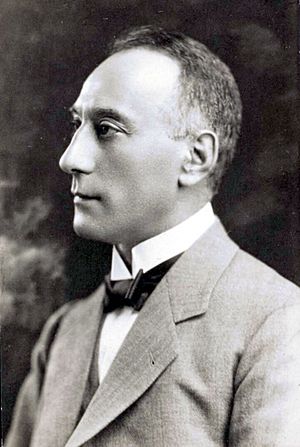Ernst Cohen facts for kids
Quick facts for kids
Ernst Julius Cohen
|
|
|---|---|
 |
|
| Born | 7 March 1869 |
| Died | March 6, 1944 (aged 74) Auschwitz-Birkenau, German-occupied Poland
|
| Awards | Fellow of the Royal Society |
| Scientific career | |
| Fields | Chemistry |
| Doctoral advisor | Jacobus Henricus van 't Hoff |
Ernst Julius Cohen (7 March 1869 – 6 March 1944) was a Dutch Jewish chemist. He was well-known for his studies on how metals can exist in different forms. This is called allotropy. For example, carbon can be a soft pencil lead or a hard diamond.
Cohen studied chemistry with famous scientists. He learned from Svante Arrhenius in Stockholm and Henri Moissan in Paris. He also studied with Jacobus van't Hoff in Amsterdam. In 1893, he became Van't Hoff's assistant. Later, in 1902, he became a professor at the University of Utrecht. He taught there until he retired in 1939. Throughout his life, Cohen spent a lot of time studying the allotropy of tin.
A Scientist's Work
Ernst Cohen explored many areas in chemistry. He studied how elements and compounds can have different forms. This is known as polymorphism. He also worked on photographic chemistry, which is about how photos are made. His research included electrochemistry, which looks at how electricity and chemical reactions are linked. He also studied piezochemistry, which is about how pressure affects chemicals. Cohen was also interested in the history of science. He wrote over 400 scientific papers and many books.
Important Recognitions
Cohen was recognized for his important work. In 1913, he became a member of the Royal Netherlands Academy of Arts and Sciences. This is a very important group for scientists in the Netherlands. In 1926, he was chosen as a Foreign Member of the Royal Society in London. This is a top honor for scientists from other countries.
During World War II, Ernst Cohen faced difficult times. Because he was Jewish, he was arrested by Nazi police in 1942. He was forced to leave his job. He had worked hard to help scientists from different countries work together. This was especially true after World War I. Sadly, Ernst Cohen died on 6 March 1944. He was killed at the Auschwitz concentration camp.
Books by Cohen
- "J. H. van 't Hoff, his life and work", 1912
- "Impressions of the Land of Benjamin Franklin", 1928
 | Georgia Louise Harris Brown |
 | Julian Abele |
 | Norma Merrick Sklarek |
 | William Sidney Pittman |

